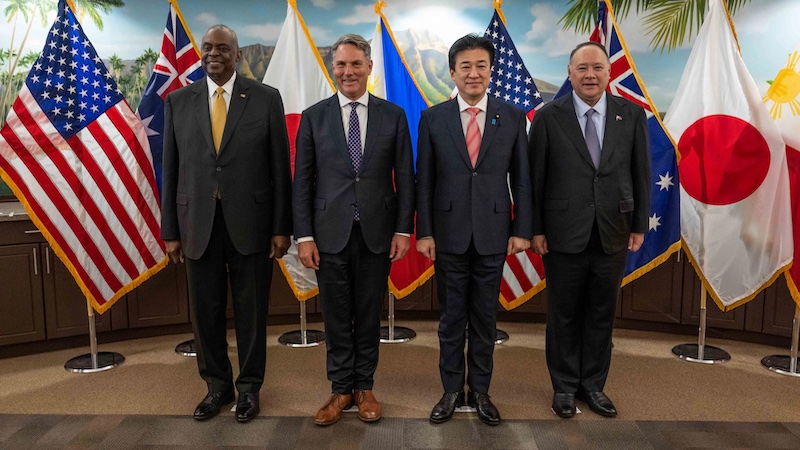Countering China’s Grip: Japan-Philippines Pact Reshapes Southeast Asian Security – OpEd

The central thesis of this article emphasizes the profound significance of the recent defence agreement between Japan and the Philippines. It highlights the transformative potential of this agreement in shaping the regional dynamics throughout Southeast Asia. The collaborative endeavour aspires to counterbalance China's escalating influence in the area by strengthening military cooperation and reinforcing a strategic alliance. Notably, this agreement can reconfigure prevailing power structures and security measures in the region. Consequently, it is of utmost value to scrutinize the implications of this agreement and discern its ramifications for regional stability, power dynamics, and future geopolitical evolutions in Southeast Asia.
The significance of this agreement is further highlighted when considering its timing and the context in which it is taking place. In recent years, China's assertive expansion in the South China Sea has led to heightened tensions with neighbouring countries, including the Philippines. Despite the arbitration verdict by the Permanent Court of Arbitration in 2016, which nullified China's extensive claims, Beijing has remained undeterred in its pursuit of actions. China has been determined to assert its dominance and has continued to increase its military presence and undertake infrastructure development on the disputed islands.
Against the backdrop of this precarious situation, the Philippines faces the formidable challenge of maintaining a delicate equilibrium between its economic ties with China and the preservation of its sovereignty and territorial integrity. President Ferdinand Jr. Marcos' decision to fortify military relations with Japan and the United States signifies a strategic pivot. By actively involving Japan, a regional pivotal actor, and addressing historical strategic concerns regarding China's ascent, the Philippines aspires to establish a robust deterrent mechanism. Japan, endowed with advanced military capabilities and a strategic position, serves as a counterweight to China's maritime ambitions. Trilateral cooperation with the United States further fortifies the collective security framework across the wider region.
The implications of this agreement go beyond mere military collaboration. It represents a shift towards a more assertive approach taken by regional stakeholders to protect their interests against China's hegemonic aspirations. The alliance serves as a clear message that unilateral actions and coercive strategies will be met with a coordinated response. This stance plays a critical role in upholding the rules-based international order, which China has undermined through its disregard for international norms and arbitration rulings.
Additionally, the agreement strengthens the strategic capabilities of the Philippines by allowing Japanese troops to engage in humanitarian exercises. This grants the Philippines access to advanced training, technology, and logistical support, enhancing not only its military readiness but also its capacity to respond to natural disasters and humanitarian crises in the region. The dual-use nature of this cooperation ensures that the benefits extend beyond military preparedness to include disaster resilience and response.
The defence pact between Japan and the Philippines holds broader significance for regional alliances and partnerships. It reinforces the Quadrilateral Security Dialogue (Quad), which consists of the United States, Japan, India, and Australia. Although the Philippines is not formally a Quad member, its deepening ties with Japan and the United States align with the Quad's objective of promoting a free and open Indo-Pacific. This alignment has the potential to foster increased collaboration between Southeast Asian countries and the Quad, thereby strengthening the regional security architecture.
Nevertheless, it is important to recognize the agreement and potential risks that come with this situation. The increased cooperation between China, Japan, and the Philippines could lead to heightened tensions and confrontations in the South China Sea. Beijing has consistently objected to what it sees as encirclement by the United States and its allies. The defence pact may be seen as a part of a larger strategy to contain China's influence, which could prompt a more assertive stance from Beijing. This has the potential to further escalate military encounters and destabilize the region.
To mitigate these risks, it is crucial to pursue a combination of engagement, diplomatic, military, and preparedness measures. Regional actors should prioritize dialogue and negotiation to manage and prevent disputes and conflicts. Confidence-building measures, such as joint exercises and transparent communication channels, can help minimize the risk of misunderstandings and inadvertent escalations. Additionally, engaging in multilateral forums and regional dialogues can provide a platform for addressing concerns and finding common ground. China, in particular, can benefit from participating in these forums to address concerns and foster cooperation.
In conclusion, the defence pact between Japan and the Philippines symbolizes a significant milestone with far-reaching implications for Southeast Asia. This pact aims to strengthen the military capabilities of the Philippines, fortify regional alliances, and act as a counterweight to China's assertive actions in the South China Sea. However, the possibility of escalated tensions underscores the importance of adopting a balanced approach that combines military preparedness with diplomatic engagement. By skillfully navigating the intricacies of Southeast Asia, these nations can enhance their security and stability while contributing to the establishment of an international order based on principles and regulations.
The opinions expressed in this article are the author's own.
References
- Al Jazeera. "Summit with US, Japan aimed at economy, South China Sea cooperation: Marcos." July 8, 2024. Al Jazeera
- Permanent Court of Arbitration. "The South China Sea Arbitration (The Republic of the Philippines v. The People's Republic of China)." July 12, 2016.
- U.S. Department of State. "U.S.-Philippines Defense Cooperation." Accessed July 8, 2024.
- Ministry of Foreign Affairs of Japan. "Japan-Philippines Relations." Accessed July 8, 2024.
